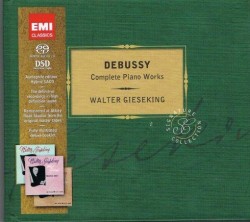 For some time now, Toshiba EMI has been remastering existing stereo recordings from EMI into SACD s that have been the buzz in audiophile circles around the world, in spite of the very high price tag. More expensive yet are the SACD re-masters processed and marketed by Esoteric, selling for around $75 a disc. Both companies do their conversions in Japan from the “master tapes” owned by EMI, Decca and Sony. EMI has the real masters in its Abbey Road Studios in London and utilizes EMI technology for the High Definition Sound reissue series. The process consists of painstakingly comparing the original analog productions to determine the correct equalization and play-back curves to ensure a truthful realization of the original sound of the analog originals. This multi-step process is described in the notes that are bound into individual hard cover art books into which the discs and original production documents, in full colour, are reproduced. They are distributed by EMI Canada and sell for domestic prices. So far, there is no duplication of albums. With one exception the discs are stereo hybrid SACD/CDs. I was intrigued by the concept of an SACD version of an original monaural recording, in this case the famous Debussy’s Complete Piano Works played by Walter Gieseking (509999 559172, 4 discs). Although it should not have been, what I heard was a complete surprise. From between the speakers came the familiar sound of Gieseking’s piano, as fresh as it was when he recorded these works in Abbey Road’s Studio 3 between 1951 and 1954 when he was acknowledged as the supreme interpreter of Debussy’s piano works. It was a thorn in the French psyche that a German pianist eclipsed their own as the great Debussy interpreter. How appropriate that these treasured performances are included in this first release of the new reissues.
For some time now, Toshiba EMI has been remastering existing stereo recordings from EMI into SACD s that have been the buzz in audiophile circles around the world, in spite of the very high price tag. More expensive yet are the SACD re-masters processed and marketed by Esoteric, selling for around $75 a disc. Both companies do their conversions in Japan from the “master tapes” owned by EMI, Decca and Sony. EMI has the real masters in its Abbey Road Studios in London and utilizes EMI technology for the High Definition Sound reissue series. The process consists of painstakingly comparing the original analog productions to determine the correct equalization and play-back curves to ensure a truthful realization of the original sound of the analog originals. This multi-step process is described in the notes that are bound into individual hard cover art books into which the discs and original production documents, in full colour, are reproduced. They are distributed by EMI Canada and sell for domestic prices. So far, there is no duplication of albums. With one exception the discs are stereo hybrid SACD/CDs. I was intrigued by the concept of an SACD version of an original monaural recording, in this case the famous Debussy’s Complete Piano Works played by Walter Gieseking (509999 559172, 4 discs). Although it should not have been, what I heard was a complete surprise. From between the speakers came the familiar sound of Gieseking’s piano, as fresh as it was when he recorded these works in Abbey Road’s Studio 3 between 1951 and 1954 when he was acknowledged as the supreme interpreter of Debussy’s piano works. It was a thorn in the French psyche that a German pianist eclipsed their own as the great Debussy interpreter. How appropriate that these treasured performances are included in this first release of the new reissues.
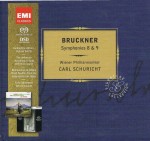 Bruckner’s Eighth and Ninth Symphonies are heard in recordings from 1963 and 1961 with Carl Schuricht conducting the Vienna Philharmonic, recorded in the Musikverein (509999 559842, 2 discs). Schuricht was a consummate Bruckner conductor long before the composer became fashionable, amply demonstrated in these two powerful readings.
Bruckner’s Eighth and Ninth Symphonies are heard in recordings from 1963 and 1961 with Carl Schuricht conducting the Vienna Philharmonic, recorded in the Musikverein (509999 559842, 2 discs). Schuricht was a consummate Bruckner conductor long before the composer became fashionable, amply demonstrated in these two powerful readings.
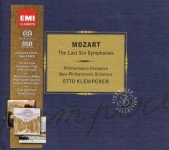 It has been a few years since I heard the following symphonies under the baton of Otto Klemperer and I had remembered them as, well, a little stodgy. Mozart: The Last Six Symphonies with the Philharmonia and the New Philharmonia (509999 559322, 3 discs) and Mendelssohn’s Third and Fourth Symphonies plus Schumann’s Fourth Symphony with the Philharmonia (509999 559102, 2 discs). Mozart’s scores might seem to be weighed down by a modern orchestra but that was the fashion until recently. Klemperer hears it the “old” way and, in fact, makes a reasonably good case for the practice. The Mendelssohns are well sprung and the Schumann is quite convincing. The recorded sound is true to the originals … only cleaner.
It has been a few years since I heard the following symphonies under the baton of Otto Klemperer and I had remembered them as, well, a little stodgy. Mozart: The Last Six Symphonies with the Philharmonia and the New Philharmonia (509999 559322, 3 discs) and Mendelssohn’s Third and Fourth Symphonies plus Schumann’s Fourth Symphony with the Philharmonia (509999 559102, 2 discs). Mozart’s scores might seem to be weighed down by a modern orchestra but that was the fashion until recently. Klemperer hears it the “old” way and, in fact, makes a reasonably good case for the practice. The Mendelssohns are well sprung and the Schumann is quite convincing. The recorded sound is true to the originals … only cleaner.
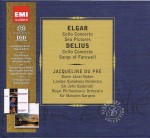 This first release would not be complete without Jacqueline du Pré’s most famous recording, the Elgar Cello Concerto under the direction of Sir John Barbirolli who also conducts Elgar’s often sublime song cycle, Sea Pictures with Janet Baker at her very best (509999 559052, 2 discs). The second disc is all Delius; the Cello Concerto with du Pré, Songs of Farewell and A Song Before Sunrise all conducted by Sir Malcolm Sargent. The disc is a treasure that should be gracing every collection.
This first release would not be complete without Jacqueline du Pré’s most famous recording, the Elgar Cello Concerto under the direction of Sir John Barbirolli who also conducts Elgar’s often sublime song cycle, Sea Pictures with Janet Baker at her very best (509999 559052, 2 discs). The second disc is all Delius; the Cello Concerto with du Pré, Songs of Farewell and A Song Before Sunrise all conducted by Sir Malcolm Sargent. The disc is a treasure that should be gracing every collection.
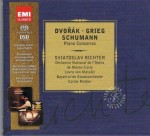 Sviatoslav Richter plays piano concertos by Dvorˇák, Grieg and Schumann conducted by Carlos Kleiber (Dvořák) and Lovro von Matacic. Here is Richter in his prime (1976 and 1974) and the emerging Carlos Kleiber yet to hit the big time (509999 559892, 2 discs). Powerhouse performances from Richter in all three with matching support from his conductors.
Sviatoslav Richter plays piano concertos by Dvorˇák, Grieg and Schumann conducted by Carlos Kleiber (Dvořák) and Lovro von Matacic. Here is Richter in his prime (1976 and 1974) and the emerging Carlos Kleiber yet to hit the big time (509999 559892, 2 discs). Powerhouse performances from Richter in all three with matching support from his conductors.
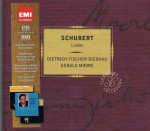 Pianist Georges Cziffra truly was a legend in his own lifetime. He was simply untouchable in Liszt’s keyboard extravaganzas and EMI recorded him extensively including the 12 Transcendental Etudes and the complete Hungarian Rhapsodies, in addition to The Mephisto Waltz No.1 and Gnomenreigen. Recorded between 1957 and 1975 in the Salle Wagram, Paris, assembling and issuing them in this series was a stroke of genius (509999 55962 2, 3 discs).
Pianist Georges Cziffra truly was a legend in his own lifetime. He was simply untouchable in Liszt’s keyboard extravaganzas and EMI recorded him extensively including the 12 Transcendental Etudes and the complete Hungarian Rhapsodies, in addition to The Mephisto Waltz No.1 and Gnomenreigen. Recorded between 1957 and 1975 in the Salle Wagram, Paris, assembling and issuing them in this series was a stroke of genius (509999 55962 2, 3 discs).
Giuseppe di Stefano sounds very fresh singing 33 Neapolitan Songs, recorded in Milan in 1953 and 1961 (509999 55926 2, 2 discs).
In his early years, could any singer top the late Dietrich Fischer-Dieskau in Schubert Lieder? Every month, music lovers everywhere looked for new releases. He was incomparable. Selected recordings from 1955 through 1959 appear on an invaluable collection, newly prepared for this series (509999 559692, 4 discs).
And one more: the Beethoven Triple Concerto with David Oistrakh, Mstislav Rostropovich and Sviatoslav Richter conducted by von Karajan in Berlin plus, from Cleveland, George Szell conducting Oistrakh and Rostropovich in the Brahms Violin Concerto and Double Concerto (509999 55978 2, 2 discs).
These reissues are a perfect example of the art that conceals the art, as there is absolutely no evidence that there have been adjustments in the sound of the originals. Maybe their motto is Do No Harm.
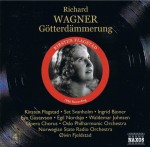 Complete recordings of Gotterdammerung on LP date back to a special performance centred around the renowned, now legendary, soprano Kirsten Flagstad who had been the Wagnerian soprano, recognized in opera houses around the globe. This was a concert production intended as a farewell performance recorded in the studios of Norwegian Radio, the missing passages being recorded two months later and a virtually complete version prepared for commercial release by Decca. Set Svanholm is the Siegfried with an impressive Egil Nordsjø as Hagen, supported by a first class cast with the Oslo Philharmonic Orchestra, the Norwegian State Radio Orchestra and a studio chorus all conducted by Øivin Fjelstad. Naxos has thankfully returned it to the catalogue in a newly restored four CD set (8.112066-69). This is a full-scale production with much to offer and little or nothing to complain about. In crystal-clear, distortion-free monaural sound with fine presence and ample dynamics, this is a full-blooded realization of the closing chapter of Wagner’s ultimate music drama, the ever fascinating, incomparable Ring cycle.
Complete recordings of Gotterdammerung on LP date back to a special performance centred around the renowned, now legendary, soprano Kirsten Flagstad who had been the Wagnerian soprano, recognized in opera houses around the globe. This was a concert production intended as a farewell performance recorded in the studios of Norwegian Radio, the missing passages being recorded two months later and a virtually complete version prepared for commercial release by Decca. Set Svanholm is the Siegfried with an impressive Egil Nordsjø as Hagen, supported by a first class cast with the Oslo Philharmonic Orchestra, the Norwegian State Radio Orchestra and a studio chorus all conducted by Øivin Fjelstad. Naxos has thankfully returned it to the catalogue in a newly restored four CD set (8.112066-69). This is a full-scale production with much to offer and little or nothing to complain about. In crystal-clear, distortion-free monaural sound with fine presence and ample dynamics, this is a full-blooded realization of the closing chapter of Wagner’s ultimate music drama, the ever fascinating, incomparable Ring cycle.



